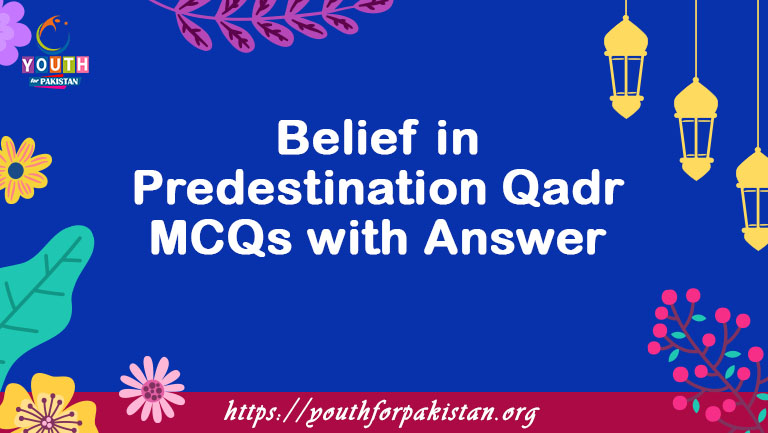The following are Belief in Predestination Qadr MCQs with answers related to Islamic Studies. We have arranged the most important and repeated MCQs in all the competitive examinations. The students can clear their concepts for Belief in Predestination Qadr MCQs online quiz by attempting these.
Belief in Predestination Qadr Online MCQs with Answers
What is the concept of predestination?
A) Determining one’s fate through actions
B) Belief in multiple deities
C) God’s predetermined plan for all events
D) Random chance
Which religion prominently features the doctrine of predestination?
A) Hinduism
B) Buddhism
C) Islam
D) Judaism
Who is known for his theological views on predestination in Christianity?
A) Martin Luther
B) John Calvin
C) Mother Teresa
D) Pope Francis
What do proponents of predestination believe about human choices?
A) They are entirely predetermined by God.
B) Humans have complete free will.
C) God has no role in human choices.
D) Humans can defy God’s will.
In Islamic theology, what is the Arabic term for predestination?
A) Qadar
B) Shirk
C) Taqiyya
D) Zakat
What is the Christian doctrine that emphasizes God’s foreknowledge but allows for human free will?
A) Predestination
B) Arminianism
C) Deism
D) Agnosticism
Which philosopher is often associated with the concept of predestination in Western thought?
A) Sigmund Freud
B) Jean-Jacques Rousseau
C) Thomas Aquinas
D) Friedrich Nietzsche
According to predestination beliefs, what does God’s plan encompass?
A) Only spiritual matters
B) All aspects of life
C) Only the afterlife
D) Human desires and ambitions
In which branch of Islam is the belief in predestination most prominent?
A) Sunni
B) Shia
C) Sufi
D) Ibadi
What do proponents of predestination often use to explain human suffering?
A) Divine punishment
B) Random chance
C) Human error
D) Natural disasters
Which religious figure in Islam is believed to be predestined to guide the Muslim community?
A) Ayatollah
B) Imam Mahdi
C) Caliph
D) Sufi mystic
What is the term for the belief that all events are predetermined, including human actions and choices?
A) Fatalism
B) Free will
C) Agnosticism
D) Polytheism
Which Christian denomination is closely associated with the concept of double predestination?
A) Roman Catholicism
B) Eastern Orthodoxy
C) Lutheranism
D) Calvinism
In Islamic theology, what is the belief in the Day of Judgment closely linked to?
A) Tawhid
B) Qiyamah
C) Zakat
D) Sufism
What is the primary focus of predestination in Hinduism?
A) Dharma
B) Karma
C) Moksha
D) Ahimsa
Which Christian theologian is known for developing the doctrine of prevenient grace?
A) Augustine of Hippo
B) John Wesley
C) Martin Luther
D) Thomas Aquinas
What is the Islamic belief regarding the extent of human free will in the context of predestination?
A) Humans have complete free will.
B) Humans have no free will.
C) Humans have limited free will within God’s plan.
D) Humans are not relevant to God’s plan.
Which religious text in Islam discusses the concept of predestination in detail?
A) Quran
B) Hadith
C) Tafsir
D) Sunnah
What is the belief that God has predetermined who will be saved and who will be damned in Christianity?
A) Universalism
B) Arminianism
C) Double predestination
D) Pelagianism
In Hinduism, what is the concept of “samsara” related to in the context of predestination?
A) The cycle of birth and death
B) Divine intervention
C) Ascetic practices
D) Rituals and ceremonies
Who is often credited with introducing the concept of predestination into Islamic thought?
A) Prophet Muhammad
B) Imam Ali
C) Ibn Taymiyyah
D) Ibn Sina (Avicenna)
What is the belief that God has preordained all events, including the salvation of individuals, but not damnation?
A) Arminianism
B) Universalism
C) Single predestination
D) Double predestination
Which ancient Greek philosopher explored the concept of fate and determinism?
A) Socrates
B) Plato
C) Aristotle
D) Epicurus
What do proponents of predestination believe about God’s knowledge of the future?
A) God has no knowledge of the future.
B) God’s knowledge of the future is limited.
C) God knows and controls the future.
D) God’s knowledge of the future is irrelevant.
Which Christian denomination holds a view of predestination that emphasizes human cooperation with God’s grace?
A) Calvinism
B) Arminianism
C) Eastern Orthodoxy
D) Anglicanism
In Sikhism, what is the concept of “Hukam” closely related to in the context of predestination?
A) Karma
B) Dharma
C) Mukti
D) Reincarnation
Which Christian theologian is known for developing the concept of “middle knowledge” as a response to predestination questions?
A) Augustine of Hippo
B) John Calvin
C) Luis de Molina
D) John Wesley
What is the belief in predestination’s impact on individual responsibility?
A) It reduces individual responsibility.
B) It increases individual responsibility.
C) It has no impact on individual responsibility.
D) It eliminates individual responsibility.
Which philosopher is known for his works on determinism and free will, challenging the concept of predestination?
A) Immanuel Kant
B) Friedrich Nietzsche
C) Jean-Paul Sartre
D) Albert Camus
In Islamic theology, what is the belief that God’s will prevails over all human actions called?
A) Tawhid
B) Qadar
C) Sunnah
D) Taqiyya
What is the primary focus of predestination in Buddhism?
A) Nirvana
B) Karma
C) Four Noble Truths
D) Meditation
Which Christian theologian is known for his doctrine of “divine simplicity” in the context of predestination?
A) John Wesley
B) John Calvin
C) Thomas Aquinas
D) Martin Luther
What is the belief that all events are determined by fate or destiny, often beyond human control?
A) Predestination
B) Nihilism
C) Fatalism
D) Atheism
In Hinduism, what is the concept of “karma” related to in the context of predestination?
A) Divine intervention
B) The cycle of birth and death
C) Rituals and ceremonies
D) Ascetic practices
Which branch of Christianity emphasizes the idea that God’s grace is irresistible and predetermined?
A) Arminianism
B) Eastern Orthodoxy
C) Calvinism
D) Anglicanism
In which religious text of Sikhism is the concept of predestination discussed?
A) Guru Granth Sahib
B) Japji Sahib
C) Dasam Granth
D) Sukhmani Sahib
What is the belief that God has predetermined all events and human actions, including evil deeds?
A) Universalism
B) Arminianism
C) Single predestination
D) Double predestination
In which branch of Islam is the belief in predestination most strongly rejected?
A) Sunni
B) Shia
C) Sufi
D) Ibadi
What is the belief that God has predetermined all events but leaves human salvation to individual choice?
A) Arminianism
B) Universalism
C) Single predestination
D) Double predestination
In which religious tradition is the concept of “kismet” associated with predestination?
A) Buddhism
B) Islam
C) Sikhism
D) Hinduism
Who is considered the founder of the Calvinist branch of Christianity, known for its strong emphasis on predestination?
A) Martin Luther
B) John Wesley
C) John Calvin
D) Pope Francis
What is the Islamic belief that God’s knowledge encompasses all things, including the past, present, and future?
A) Tawhid
B) Qadar
C) Sunnah
D) Taqiyya
In Jainism, what is the concept of “niyati” related to in the context of predestination?
A) Non-violence (Ahimsa)
B) Karma
C) Right Faith (Samyak Darshana)
D) Ascetic practices
What is the belief that God has predetermined all events but leaves human damnation to individual choice?
A) Arminianism
B) Universalism
C) Single predestination
D) Double predestination
Which philosophical concept explores the tension between predestination and human free will?
A) Nihilism
B) Existentialism
C) Stoicism
D) Hedonism
What is the belief that God has predestined some individuals for salvation but not others in Christianity?
A) Universalism
B) Arminianism
C) Single predestination
D) Double predestination
In which religious text is the concept of “Wyrd” associated with predestination?
A) Bible
B) Quran
C) Bhagavad Gita
D) Beowulf
What is the belief that God has predetermined the final outcome of all events, but not the means to that end?
A) Arminianism
B) Universalism
C) Single predestination
D) Double predestination
In which religious tradition is the concept of “kala” associated with predestination?
A) Buddhism
B) Islam
C) Sikhism
D) Hinduism
What is the belief that God has predetermined all events and human actions, including salvation and damnation?
A) Universalism
B) Arminianism
C) Single predestination
D) Double predestination










